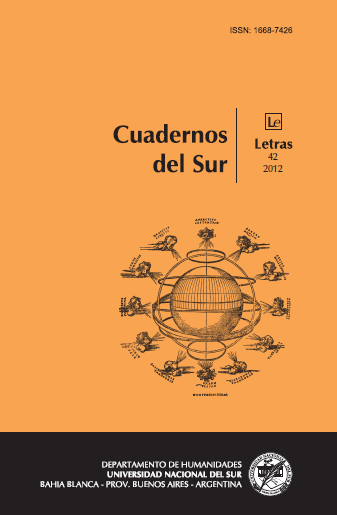Dictaduras, narrativa y sexualidad disidente: un enfoque comparatístico de la literatura de la memoria queer
Keywords:
Memory, Queer, Argentine, GermanyAbstract
The “queer lives” (Butler, 2009), that lifes that can`t be “mourned” become “queer victims” inside a system that excludes and silences the “abjects” sexualities. In the historical context of the second world war and the 70`s dictatorship in Latin America, these “queer victims” are elided fellows, that are silenced or forgotten by the canon and historical memory. This work seeks to establish continuities, similarities and differences in the fictionalization of LGBTIQ situation in the Latin American dictatorships and the Nazi regime respectively, through fictions that function as paradigmatic examples about the treatment of the subject in recent cultural texts. We will work around the formation of rioplatense ́s queer literature and the fictional expression of extermination situations of queer individuals.
Downloads
References
Bruzzone, Félix (2008), Los topos, Buenos Aires: Mondadori
Butler, Judith (2009), “Performatividad, precariedad y políticas sexuales” en AIBR. Revista de Antropología Iberoamericana, vol. 4, Nº 3, pp. 321-336.
Butler, Judith, (1990) GenderTrouble. Feminism and the Subversion of Identity, New York, Routledge.
Degiovanni, Fernando (2004), “The Invention of the Classics: Nationalism, Philology and Cultural Politics in Argentina”, en Journal of Latin American Cultural Studies, vol. 13, pp. 243-260.
Epstein, Rob/Friedman, Jeffrey (2000), Paragraph 175, Nueva York, New Yorker Films.
Fischer, Erica (1994), Aimée y Jaguar. Una historia de amor, Berlín 1943, Barcelona, Seix Barral.
Franck, Julia (2009), La mujer del mediodía, Barcelona, Tusquets.
Friera, Silvina (2008) “Cómo rastrear el pasado con las letras. Entrevista a Félix Bruzzone” en Página/12, viernes 12 de septiembre. Disponible en http://www.pagina12.com.ar/diario/suplementos/espectaculos/4-11256-2008-09-12.html
García, María Eugenia (2009) “Escribir desde la ausencia. Entrevista a Félix Bruzzone” en La Nación-ADN Cultura, sábado 10 de enero. Disponible en http://www.lanacion.com.ar/nota.asp?nota_id=1087394
García, Mariano (2009), Letra muerta, Buenos Aires, Adriana Hidalgo.
Giles, Geoffrey J. (1992), “The Most Unkindest Cut of All: Castration, Homosexuality and Nazi Justice” en Journal of Contemporary History, vol. 27, pp. 41-61.
Giorgi, Gabriel (2004), Sueños de exterminio, Rosario, Beatriz Viterbo.
Hammermeister, Kai (1997), “Inventing History: Toward a Gay Holocaust Literature”. The German Quaterly¸ vol. 70, Nº 1, pág. 18-26.
Havilio, Iosi (2010), Estocolmo o La conclusión del sistema de las cosas, Buenos Aires, Mondadori.
Heger, Heinz (2002), Los hombres del triángulo rosa. Memorias de un homosexual en los campos de concentración nazis, Amaranto, Madrid.
Huyssen, Andreas (2002), En busca del futuro perdido. Cultura y memoria en tiempos de globalización, Buenos Aires, FCE.
Jagose, Annamarie (1996), Queer Theory: An Introduction, New York, New York UP.
LaCapra, Dominick (2005), Escribir la historia, escribir el trauma, Buenos Aires, Nueva Visión.
Mahlsdorf, Charlotte von (1994), Yo soy mi propia mujer, Barcelona, Tusquets.
Malva (2010), Mi recordatorio. Autobiografía de Malva, Buenos Aires, Libros del rojas.
Mathias, Sean (1997), Bent, Londres, Arts Council of England.
Müller, Herta, (2011) Todo lo que tengo lo llevo conmigo, Buenos Aires, Punto de lectura. [Atemschaukel, 2009]
Punte, María José (2011), “La injerencia de los Transformers en los triunfos estéticos de la narrativa argentina reciente”, en Revista Anclajes, XV, 2.
Seel, Pierre (2001), Pierre Seel. Deportado homosexual, Barcelona, Bellaterra.
Sherman, Martin, (1988) “Bent” en Out Front: Contemporary Gay and Lesbian Plays. Don Shewey (Ed.), New York, Grove Press.
Sternweiler, Andreas (2004), Self-confidence and persistence. Two Hundred Years of History, Berlín, Schwules
Museum.
Ugarte Pérez, Javier, (2003) “El “olvido” de los estudios históricos” en Orientaciones: revista de homosexualidades, Nº 5, pp. 7-28.
Villordo, Oscar Hermes (1986), La otra mejilla, Buenos Aires, Sudamericana.
Wamba Gaviña, Graciela (2011), “Discurso de la memoria, holocausto y apropiación de hijos, nazismo y dictadura en Argentina”, en Puertas Abiertas, Nº 7.
Downloads
How to Cite
Issue
Section
License
Copyright (c) 2012 Facundo Saxe

This work is licensed under a Creative Commons Attribution-NonCommercial-ShareAlike 4.0 International License.
Aquellos autores/as que tengan publicaciones con esta revista, aceptan los términos siguientes:
- Los autores/as conservarán sus derechos de autor y garantizarán a la revista el derecho de primera publicación de su obra, el cuál estará simultáneamente sujeto a la licencia Atribución-No Comercial-CompartirIgual 4.0 Internacional CC BY-NC-SA 4.0.
- Los autores/as podrán adoptar otros acuerdos de licencia no exclusiva de distribución de la versión de la obra publicada (p. ej.: depositarla en un archivo telemático institucional o publicarla en un volumen monográfico) siempre que se indique la publicación inicial en esta revista.
- Se permite y recomienda a los autores/as difundir su obra a través de Internet (p. ej.: en archivos telemáticos institucionales o en su página web) una vez publicado su trabajo, lo cual puede producir intercambios interesantes y aumentar las citas de la obra publicada. (Véase El efecto del acceso abierto).










